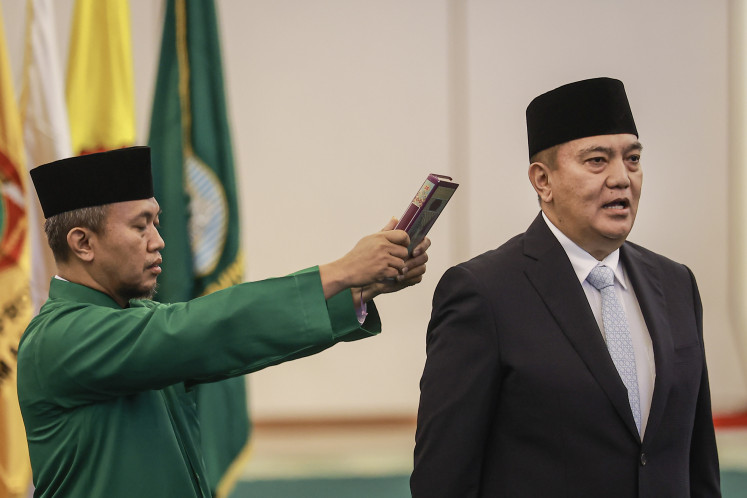Govt allocates targets for subsidized microloans
The government has started to allocate disbursement targets for each participant of its subsidized loan program as it expects more banks and multifinance firms to join the scheme
Change text size
Gift Premium Articles
to Anyone

T
he government has started to allocate disbursement targets for each participant of its subsidized loan program as it expects more banks and multifinance firms to join the scheme.
Braman Setyo, deputy of financing at the Cooperatives and Small and Medium Enterprises (SME) Ministry, said the biggest allocation of the total Rp 100 trillion (US$7.2 billion) of microcredit program (KUR) loans to be disbursed this year would go to state-owned lender Bank Rakyat Indonesia (BRI).
'BRI will remain dominant in the program as it is targeted to disburse Rp 67.5 trillion of KUR loans this year,' Braman said in Jakarta recently.
State-owned lender Bank Mandiri has the second-biggest target with Rp 13 trillion, followed by its counterpart Bank Negara Indonesia (BNI) with Rp 12 trillion, while private lenders are expected to disburse Rp 4 trillion.
The remaining Rp 2.5 trillion and Rp 1 trillion disbursements were allocated to regional development banks and multifinance companies, respectively, Braman said.
'Those are temporary allocations, because President Joko ['Jokowi'] Widodo expects disbursement of KUR loans to reach Rp 120 trillion. The ministry's KUR committee will conduct further assessments at mid-year,' Braman said.
Muhammad Irfan, director for business and small and medium enterprises at BRI, said the bank was convinced that it would be able to achieve its huge KUR target this year as it had a large capacity to disburse microloans for many years.
'[The target] is achievable, because Rp 67.5 trillion is only half of our annual capacity of microloan disbursement. We usually disburse an average of Rp 150 trillion of microloans each year,' he said.
As the economy could improve, Irfan said BRI was also optimistic that its microloans, which include KUR, would grow around 19 percent to 20 percent this year, higher than 17 percent growth booked last year.
In 2015, BRI disbursed Rp 16.2 trillion of KUR loans, lower than its target of Rp 20 trillion, because the program's launch was delayed until mid-August. That also affected other participants ' state-owned lender Mandiri and BNI ' along with private bank Sinarmas, which only disbursed KUR credit for Indonesian migrant workers.
KUR loan disbursement by those four banks only reached Rp 22.7 trillion in 2015, equal to 75.85 percent of the Rp 30 trillion targeted last year.
However, despite the nationwide underachievement, Bank Mandiri corporate secretary Rohan Hafas said the lender's KUR loan disbursement in 2015 reached Rp 3.5 trillion to 70,318 debtors, exceeding its target of Rp 3.2 trillion.
'We will optimize all of our networks to boost KUR loans this year, while also educating and guiding our customers, so that they can develop their businesses,' he said.
In order to achieve the 2016 nationwide KUR target, the government has allowed more banks, including privately owned and regional development banks (BPD), to join the program, with certain requirements in terms of financial situation and business portfolios.
Braman said the Financial Services Authority (OJK) had given approval for two BPDs, Bank Kalbar from West Kalimantan and Bank NTT from East Nusa Tenggara, to take part in the program, while waiting for six others that were deemed eligible.
'We haven't received the names of the six BPDs, but we have been informed that there are at least 10 private banks deemed eligible for the program,' he said, adding that the ministry was also waiting for the OJK's approval for multifinance companies that would be considered eligible.









